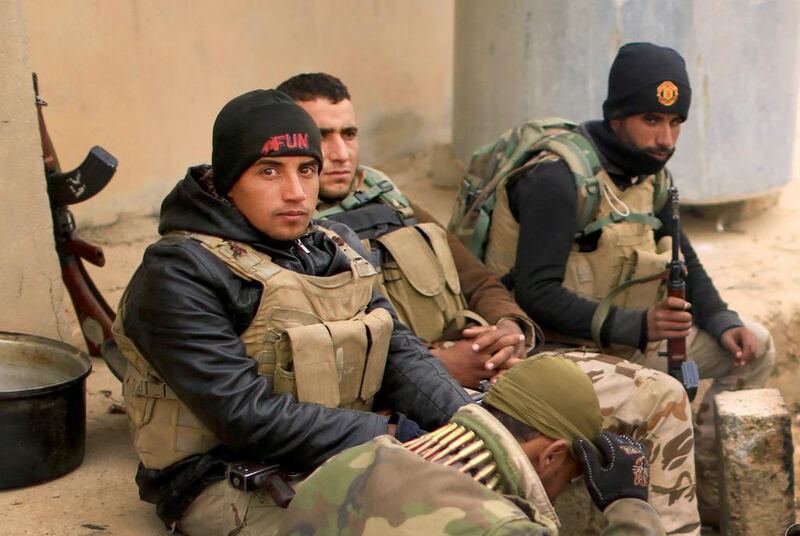SHAYYALAH AL IMAM, IRAQ // When the men — and one woman — from the Sunni fighters of the Lions of the Tigris military unit gathered with some of their tribal leaders in a village near Mosul, the perils posed by ISIL were not foremost in their minds. Instead, they discussed their deep distrust of the politicians who govern Iraq now. So pervasive is the mistrust that some tribal leaders even believe ISIL is part of an elaborate plot to weaken Sunnis.
“Everyone knows ISIL will be defeated. The conspiracy was designed to hurt Iraq, especially Sunnis, after we liberate Mosul,” said Abdel Rahman Ali, a tribal commander. “Our own politicians are behind it.”
Top tribal commander Sheikh Mohammed Al Jibouri said, “Iraq needs serious reforms. Only serious reforms will lead to the unity of Iraq.”
Like many Sunnis, the minority who dominated under Saddam and then watched the majority Shi’ites rise to power, they are disillusioned with a governing system that allocates posts according to sects. Sunnis themselves are divided and lack a strong leadership, adding to Iraq’s fragmentation.
The Lions of the Tigris are part of the Popular Mobilisation Committee, or Hashid Shaabi, which was formed to take on the hardline Sunnis of ISIL after they swept through northern Iraq in 2014, facing little resistance from the army.
Hashid Shaabi mostly comprises Shi’ites but there are also Sunnis, such as the 655-strong Lions of the Tigris unit, who fought alongside government soldiers, capturing villages in the offensive to drive ISIL from its stronghold of Mosul, Iraq’s second largest city. Such apparent cooperation between soldiers and tribesmen lends credibility to the Shi’ite-led government in Baghdad, where prime minister Haider Al Abadi has struggled to persuade Sunni tribesmen — who helped American forces defeat Al Qaeda during the 2003-11 occupation — to join the battle against ISIL.
But some tribesmen doubt the politicians have the resolve or desire to unify a nation now awash with sectarian bloodshed since the US-led invasion toppled Saddam Hussein.
Officials believe the Mosul offensive, the biggest ground operation since 2003, could make or break Iraq. If it inflames sectarian tensions in the predominantly Sunni city, the fighting could lead to Iraq’s partition, they warn.
But if the campaign goes smoothly and a new administration in Mosul is seen as nonsectarian, that could help the country to unite.
Mr Ali said federalism modelled on the autonomous Kurdish region in northern Iraq is the best option, even though that has created friction with Baghdad over oil resources.
As the men spoke, ISIL militants fired more mortar bombs towards their unit. One day earlier, bland collection of cement houses overlooking the desert was attacked by suicide bombers.
Warming his hands by a small campfire was Nashwan Sahn, a Sunni tribesman who has been fighting Islamist militants in Iraq for 11 years, taking on Al Qaeda and then ISIL. His companion on guard duty? A Shiite soldier. Both said they support Iraqi unity but neither had any faith in the politicians to manage the sectarian tensions which provoked a civil war in 2006-2007.
Mr Sahn said Sunni and Shiite politicians were as bad as each other. “Federalism would be good but only if we have good leaders,” he said. “We liberate these villages where Sunnis live. Yet Sunni politicians who have constituents here have never visited us at the front line.”
Miaad Madaad, the only female member of the Lions of the Tigris, clutched an AK-47 assault rifle and vowed to defeat ISIL. “The last time they came to my house and threatened me I threw rocks at them and called them dogs,” she said proudly.
ISIL militants beheaded her father-in-law and brother-in-law. But her story illustrates the sectarian and ethnic complexities and mistrust facing Iraq.
When she and her husband fled to the relatively stable Kurdish region earlier this year, he was arrested by Kurdish fighters who suspected him of being an ISIL fighter.
* Reuters





